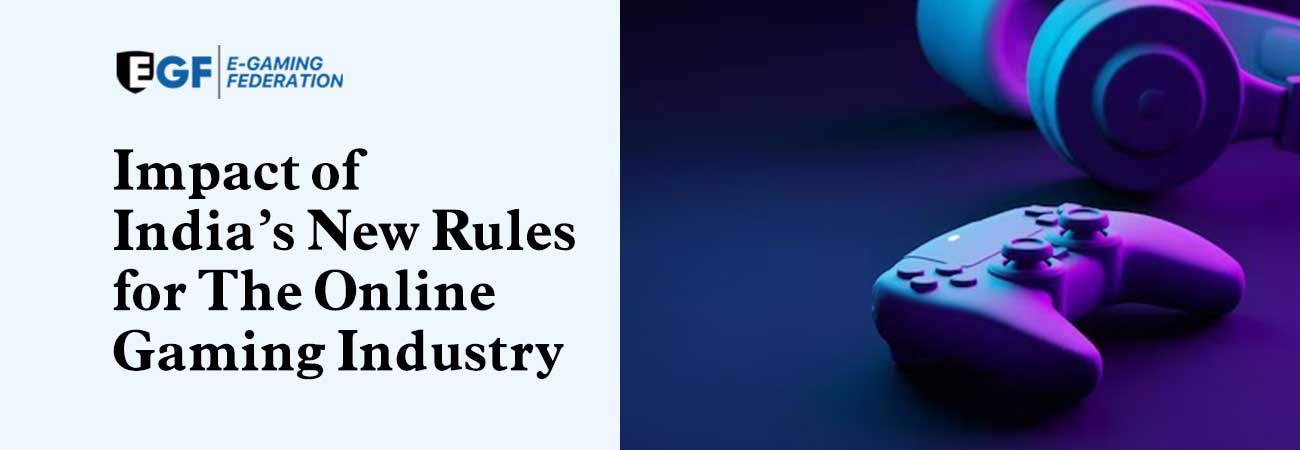


India's online gaming industry has rapidly grown in popularity due to the widespread use of smartphones and accessible internet connections. Millions of people are now participating in various online games, including card games, fantasy sports, and e-sports, making this sector highly revenue-generating. However, the industry's expansion has raised concerns about the need for regulation to ensure fair gameplay, and user safety, and prevent harmful effects of excessive gaming. In April 2023, the GOI proposed amendments to the existing Information Technology (Intermediary Guidelines and Digital Media Ethics Code) Rules, in 2021 in response to these concerns.
The new rules also introduce several categories and definitions of online games, such as online real money games, permissible online games, and permissible online real money games. They also propose establishing a self-regulatory structure for the online gaming market, whereby online gaming intermediaries must comply with certain due diligence, content monitoring, and user protection requirements, as well as obtain verification from a body for online gaming regulations, hosting permissible online real money games.
Some of the key amendments in the online gaming rules and their implications in the Online Gaming Industry are as follows:
One of the key requirements of the amended rules is that online gaming platforms must mandate age restrictions, allowing only users above the age of 18 to participate in real-money online gaming activities. Platforms are also required to verify the age of users through a robust age verification process, including the submission of government-issued identification documents, etc.
Impact: This amendment will help protect minors from the potential negative effects of online gaming, such as addiction and financial loss.
The amended rules impose strict restrictions on the marketing and promotional activities of online gaming platforms. Advertisements must not be targeted at children, encourage excessive gaming, or depict gaming as a source of income. Online Gaming platforms must ensure that the content they are promoting is not defamatory, obscene, or inflammatory. They must also ensure that their content does not promote terrorism, violence, or any other illegal activity.
Impact: Due to the necessity to reconsider their marketing plans, online gaming companies will probably have more transparency in their advertising content. This may also shift the marketing platform preferences and ad rupee spend. Warnings alerting players to possible addiction, social and other harms will be more explicit within the content. Reduced brand visibility and a slower rate of user acquisition can also be a result of this. However, it will also support the promotion of responsible gaming and the reduction of deceptive advertising with online gaming regulations.
Licences and registrations are one of the most important regulatory measures that the Indian Government has introduced to govern online gaming platforms.
According to the new rules, any online gaming platform intending to operate in India is required to obtain a licence from the self-regulatory authority before commencement. For an organised and regulated online gaming industry, it is mandate to follow licensing requirements. These standards may include specifications for responsible gaming practices, data security, and measures to prevent fraud and money laundering. If certain criteria are not met then the licence may be revoked, penalties assessed, or even legal action can be taken.
Impact: By requiring licences, only compliant and reputable platforms will be able to operate. This will safeguard the users from dishonest operators. It will aid in levelling the playing field for providers of online gaming services and prevent unfair competition. However, the licensing procedure may be expensive and time-consuming, which might deter new entrants and stifle innovation in the industry.
The amended rules introduce a revenue-sharing model between the government and online gaming platforms. It is important that platforms must pay appropriate taxes in addition to a licence fee that is deducted from their Gross Gaming Revenue (GGR).
Impact: The revenue-sharing model will give the government a new source of income that can be utilised to pay for infrastructure improvements and social welfare programs. However, it may also put more financial pressure on gaming platforms, which might result in higher user fees or reduced investments in the development of the platform.
The new measures aim to promote safe and responsible gaming practices and protect users from the adverse effects of excessive gaming. Responsible gaming measures include setting limits on deposits, playing time, and self-exclusion. Further, players will also be restricted on the amount of time they spend on gaming platforms in order to reduce the risk of addiction and compulsive behaviour. Another important aspect of responsible gaming is to provide players with the option to self-exclude from gaming activities. This means that users can choose to exclude themselves from playing on the platform for a specific time.
Impact: These measures will undoubtedly benefit users by promoting responsible practices and protecting them from the negative consequences of excessive gaming. However, online gaming industry may see a decrease in user engagement and revenue as some users may choose to limit their gaming activities or self-exclude entirely. However, user well-being and safety must remain the primary focus in the gaming sector, and responsible gaming regulations are an important move in achieving this goal.
The amended rules in the online gaming industry emphasise promoting healthy competition and innovation and technological advancements. Clear guidelines and a supportive regulatory environment will help in making a healthy environment, growth, and expansion for online gaming operators. The amended rules can encourage innovation and provide responsible use of new technologies that can foster growth and improve the quality of services available to players.
Impact: It is important to keep in mind that online gaming rules can affect innovation in the industry both favourably and unfavourably. Regulations that restrict the use of specific technologies or data collection may make it more challenging for operators to innovate and offer new services to players. This might hinder the growth of the industry and stunt innovation and technological advancements.
The online gaming industry has experienced significant growth in recent years, with the increasing popularity of online gaming platforms. With this growth, there has been a growing concern about the security and ethical standards of the industry. The newly amended online gaming rules can set higher standards for security, responsible gaming, and ethical conduct in the industry.
Impact: The impact of these improved industry standards on the online gaming sector can be significant as online gaming operators can attract a wider audience and retain their existing customer base. This can lead to increased revenue and profitability as well as a positive reputation for the industry.
One of the key aspects of the new gaming rules in the online gaming industry is the classification and verification of online games. Classification means the process of assigning a rating to a game based on its content. This is done to ensure that games are appropriate for certain age groups and that they do not contain any content that could be harmful to players. Verification on the other hand refers to the process of verifying the real-money game as a permissible online real-money game. This is done to prevent fraud and ensure that players are of a legal age to play real-money games.
Impact: These rules have been put in place to ensure that games are safe and appropriate for players of all ages and that players are protected from fraudulent activities. Another impact of these new rules is that game developers must invest more money and time into ensuring that their games are appropriately classified and verified.
The online gaming sector has seen tremendous growth in recent years, with more and more people turning to online gaming as a source of entertainment and social interaction. While the benefits of online gaming are many, there are also concerns about data protection and privacy for online gamers. Data protection refers to the measures taken to safeguard personal information from unauthorised access, use, or disclosure. The use of personal information in online gaming can have psychological implications. Online gaming platforms may use personal information to manipulate gamers' behaviour, such as encouraging them to spend more money on in-game purchases or play for a longer period. This can lead to addiction and other mental health issues.
Impact: Identity theft is one of the most serious consequences of data protection and privacy in online gaming. Hackers can obtain gamers’ personal information and use it to steal their identity, resulting in financial loss and other severe consequences. To address these issues, online gaming platforms must put an emphasis on data security and privacy. Before collecting and utilising personal information, they should get full permission from users and provide clear information on how the information will be used.
All in all, India’s call for online gaming regulations is a positive step towards developing a responsible and sustainable gaming industry in the nation. While there may be some concerns about the impact of the regulations on innovation and growth in the gaming industry, the benefits of promoting responsible gaming and shielding minors from the effects of excessive gaming can be resolved. In the upcoming years, it will be interesting to see how the industry responds to the new rules and how it will impact the growth of the online gaming sector in the country.